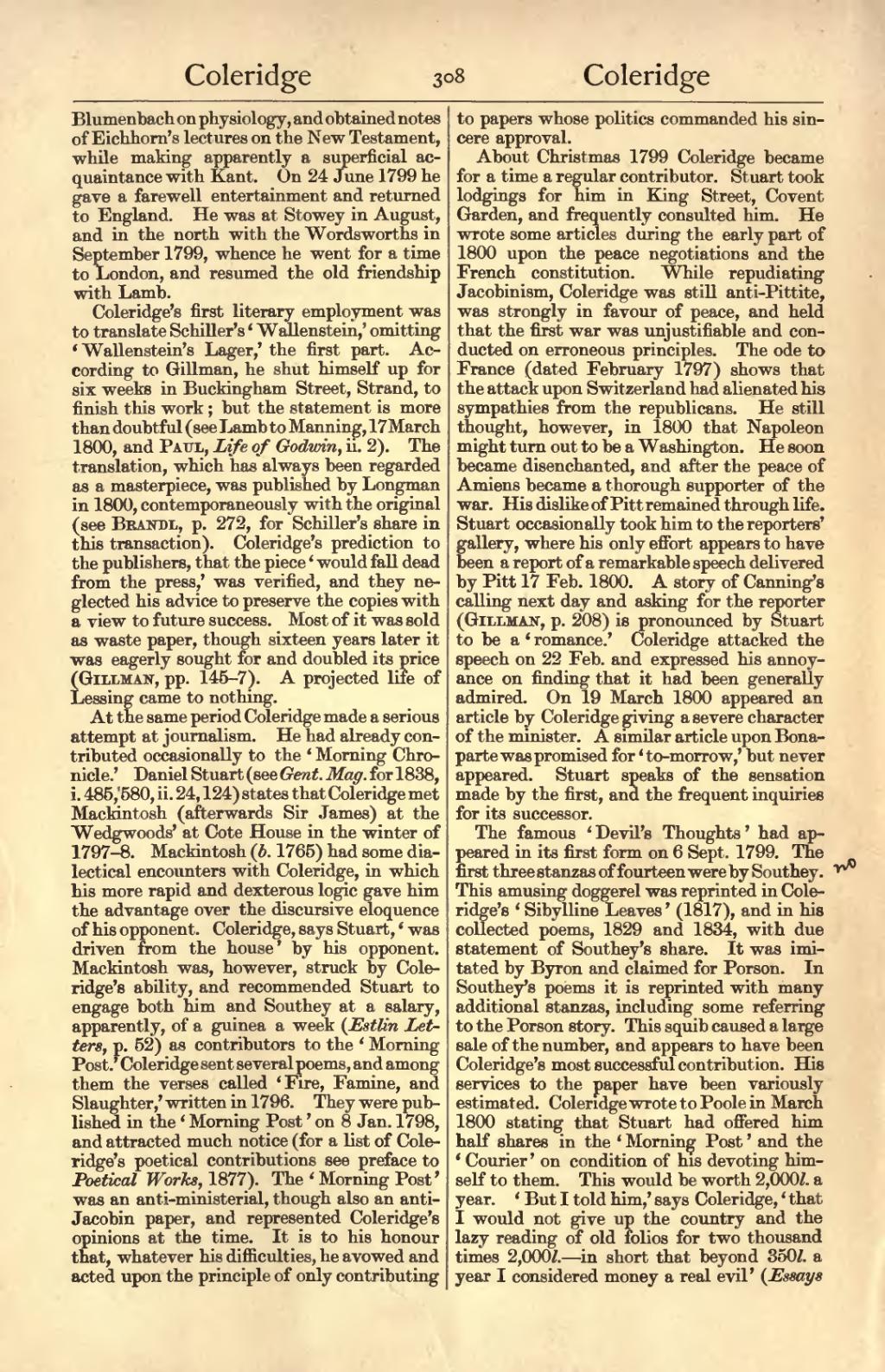Blumenbach on physiology, and obtained notes of Eichhorn's lectures on the New Testament, while making apparently a superficial acquaintance with Kant. On 24 June 1799 he gave a farewell entertainment and returned to England. He was at Stowey in August, and in the north with the Wordsworths in September 1799, whence he went for a time to London, and resumed the old friendship with Lamb.
Coleridge's first literary employment was to translate Schiller's ' Wallenstein,' omitting ' Wallenstein's Lager,' the first part. According to Gillman, he shut himself up for six weeks in Buckingham Street, Strand, to finish this work ; but the statement is more than doubtful (see Lamb to Manning, 17 March 1800, and Paul, Life of Godwin, ii. 2). The translation, which has always been regarded as a masterpiece, was published by Longman in 1800, contemporaneously with the original (see Brandl, p. 272, for Schiller's share in this transaction). Coleridge's prediction to the publishers, that the piece 'would fall dead from the press,' was verified, and they neglected his advice to preserve the copies with a view to future success. Most of it was sold as waste paper, though sixteen years later it was eagerly sought for and doubled its price (Gillman, pp. 145-7). A projected life of Lessing came to nothing.
At the same period Coleridge made a serious attempt at journalism. He had already contributed occasionally to the ' Morning Chronicle.' Daniel Stuart (see Gent. Mag. for 1838, i. 485/580, ii. 24, 124) states that Coleridge met Mackintosh (afterwards Sir James) at the Wedgwoods' at Cote House in the winter of 1797-8. Mackintosh (b. 1765) had some dia- lectical encounters with Coleridge, in which his more rapid and dexterous logic gave him the advantage over the discursive eloquence of his opponent. Coleridge, says Stuart, 'was driven from the house' by his opponent. Mackintosh was, however, struck by Coleridge's ability, and recommended Stuart to engage both him and Southey at a salary, apparently, of a guinea a week (Estlin Letters, p. 52) as contributors to the ' Morning Post.' Coleridge sent several poems, and among them the verses called 'Fire, Famine, and Slaughter,' written in 1796. They were published in the ' Morning Post ' on 8 Jan. 1798, and attracted much notice (for a list of Coleridge's poetical contributions see preface to Poetical Works, 1877). The ' Morning Post ' was an anti-ministerial, though also an anti-Jacobin paper, and represented Coleridge's opinions at the time. It is to his honour that, whatever his difficulties, he avowed and acted upon the principle of only contributing to papers whose politics commanded his sincere approval.
About Christmas 1799 Coleridge became for a time a regular contributor. Stuart took lodgings for him in King Street, Covent Garden, and frequently consulted him. He wrote some articles during the early part of 1800 upon the peace negotiations and the French constitution. While repudiating Jacobinism, Coleridge was still anti-Pittite, was strongly in favour of peace, and held that the first war was unjustifiable and conducted on erroneous principles. The ode to France (dated February 1797) shows that the attack upon Switzerland had alienated his sympathies from the republicans. He still thought, however, in 1800 that Napoleon might turn out to be a Washington. He soon became disenchanted, and after the peace of Amiens became a thorough supporter of the war. His dislike of Pitt remained through life. Stuart occasionally took him to the reporters' gallery, where his only effort appears to have been a report of a remarkable speech delivered by Pitt 17 Feb. 1800. A story of Canning's calling next day and asking for the reporter (Gillman, p. 208) is pronounced by Stuart to be a 'romance.' Coleridge attacked the speech on 22 Feb. and expressed his annoyance on finding that it had been generally admired. On 19 March 1800 appeared an article by Coleridge giving a severe character of the minister. A similar article upon Bonaparte was promised for 'to-morrow,' but never appeared. Stuart speaks of the sensation made by the first, and the frequent inquiries for its successor.
The famous 'Devil's Thoughts' had appeared in its first form on 6 Sept. 1799. The first three stanzas of fourteen were by Southey. This amusing doggerel was reprinted in Coleridge's ' Sibylline Leaves ' (1817), and in his collected poems, 1829 and 1834, with due statement of Southey's share. It was imitated by Byron and claimed for Porson. In Southey's poems it is reprinted with many additional stanzas, including some referring to the Porson story. This squib caused a large sale of the number, and appears to have been Coleridge's most successful contribution. His services to the paper have been variously estimated. Coleridge wrote to Poole in March 1800 stating that Stuart had offered him half shares in the ' Morning Post ' and the ' Courier ' on condition of his devoting himself to them. This would be worth 2,000l. a year. ' But I told him,' says Coleridge, ' that I would not give up the country and the lazy reading of old folios for two thousand times 2,000l.—in short that beyond 350l. a year I considered money a real evil' (Essays
